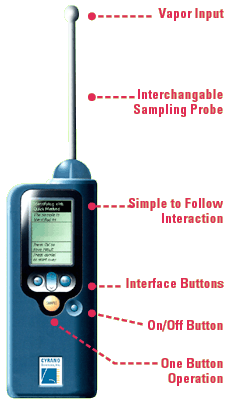Cyrano Sciences Licenses Nose-on-a-Chip for Microorganisms

U.S. Patent No. 6,017,440 covers a system for identifying microorganisms using a sensor array and a pattern recognition algorithm. The technology works by exposing the array of polymer composite sensors in Cyrano Science's electronic nose to the chemical components in a patient's breath, wound or bodily fluid. Resistance changes in sensor array components, when processed by the pattern recognition algorithm, can identify microorganisms. Practically speaking, a physician or nurse would simply need to put the handheld device close to the affected area for a few seconds, then read the result.
"For centuries, medical practitioners have used smell to diagnose disease, but never before has there been a way to ensure accuracy," said Steven Sunshine, president and chief executive officer of Cyrano Sciences. "By digitizing smell through our electronic nose technology, the medical profession will soon have a simple, accurate, non-invasive diagnosis tool to improve their treatment regime."

Cyrano expects to come out with a
handheld electronic nose sometime in early 2000.
This patented technology will be incorporated into products being developed by Cyrano Sciences and partner Welch-Allyn, a leading designer, manufacturer and marketer of innovative medical and dental diagnostic products. Together, the companies are developing a range of diagnostic products based on Cyrano's electronic nose.
Formidable Regulatory Barriers
Electronic noses are not a new idea. Cyrano and David Walt, a professor at Tufts University in Medford Mass., and several Japanese groups have been active in this area for years. The sensors work adequately – in some cases astonishingly so – for single-component gaseous chemicals. Even for simple chemical analysis, however, the sensors are easily overwhelmed by their target analyte and often require minutes to recover. The principal barrier to commercializing such devices as point-of-care diagnostic tools are even more formidable, since they must pass U.S. Food and Drug Administration testing. FDA has been slow to approve rapid, physician office tests for infectious diseases.
About Cyrano Sciences
Cyrano's portfolio of technologies originating from CalTech now numbers 10 U.S. patents and one European patent, broadly covering arrays of sensors that detect and measure chemicals in fluids, gases and vapors.
Founded in 1997, Cyrano develops proprietary electronic nose technology that senses and analyzes chemicals to provide data that can be converted into useful information for businesses. Its first e-sensory monitoring tool, the hand-held Cyranose 320, is being used in the food and chemical industries for quality control purposes, and has been tested for applications in the medical, environmental and military industries. Cyrano is also developing a NoseChip with a variety of consumer applications, including food spoilage detection.
For more information: Saskia Feast, Cyrano Sciences, 73 N. Vinedo Ave., Pasadena, CA 91107. Tel: 626-744-1700. Fax: 626-744-1777.
